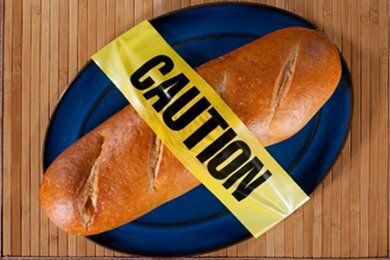Should You Try To Go Gluten-Free?
February 19, 2013 48 Comments
Gluten-free foods are a big new product category. At my local cafe, I could choose to eat a gluten-free muffin.

My cafe got me thinking about the benefits of going gluten-free, which means giving up cupcakes, pizza, bread, pasta, etc. to avoid the gluten found in wheat. If I had toast for breakfast, pizza for lunch, and a hamburger on a bun for dinner, this would be tough!
Gluten sensitivity is a fairly new area of research (see Gluten-Free, Whether You Need It or Not). Researchers aren’t sure how widespread the allergy to gluten is at this point.
Anecdotal evidence suggest that certain people can benefit from a gluten-free diet. I have a friend who went gluten-free a couple years ago and says he has more energy and less sinus infections. I’m sure plenty of you have friends like this.
Thinking about how much wheat, barley, and rye you eat on a daily basis is not a bad thing. Those of us who are trying to decrease the amount of processed foods we eat should take a look at it, but not necessarily because of gluten. Wheat is in a bunch of processed foods and so when we cut down on wheat, we will hopefully eat more fruits and vegetables.
What do the experts say? From the above article:
“It is not a healthier diet for those who don’t need it,” Dr. Guandalini, medical director of the University of Chicago’s Celiac Disease Center, said. These people “are following a fad, essentially.” He added, “And that’s my biased opinion.”
I have noticed that certain gluten-free foods, like my favorite frozen waffles, are less healthier than the their wheat counterparts. I discovered this by mistake when I purchase gluten-free waffles and checked the fiber amount (1 gram) versus the 6 grams found in the original style.
My advice is that if you want to go gluten-free don’t substitute the pizza, pies, and waffles with gluten-free versions, just stop eating pizza, pie, and waffles and see how you feel.
With my plan, you get the benefit of eating less processed foods in your diet whether or not you are actually sensitive to gluten. You really can't lose!
Have any of you adopted gluten-free diets? How has it helped you?
Other posts you might like:

Healthy & Sustainable Fish at McDonald’s?
Here we are again, talking about McDonald’s and their marketing prowess. Why do I keep bringing this up?....

What Does Snack Girl Have In Her Pantry?
Like this guy, I spend a lot of time looking at packages in the supermarket....

48 Comments:
Jennifer @ Peanut Butter and Peppers
Rhonnie
Laura
Martha
Andrea
Cathie
njoynow
Darlene
Arielle
Phoebe
Cristina @ An Organic Wife
Martha
judy
Erin
Marlene
Traci
Brenda
Arielle
Anita Burnham
Linda Griego
Laura
Phoebe
Tracey
Bridgette
Marjorie Stradinger
Colette
Sandee Spencer
Mamagou
foodsniffr@http://deals.foodsniffr.com
Christine
Casey
Meghan
Rebecca
Angela
Sue K
Lia
Colette
Lia
Colette
Jonni's Appleseeds
barb
Leslie
Jammies
Carol
Tabatha
Kimberly
Michelle Jones
Catherine